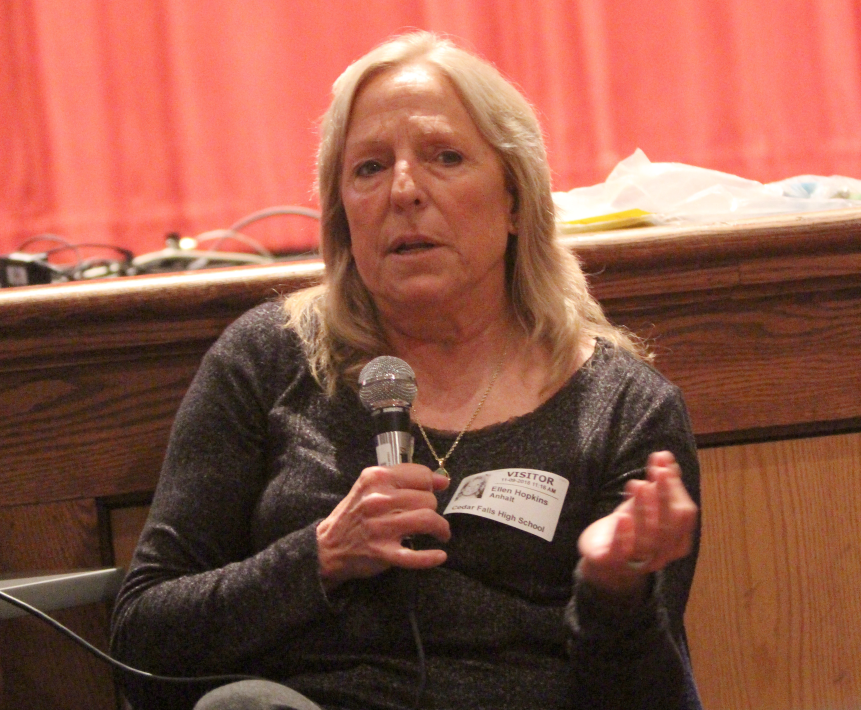Author addresses importance of writing hard topics

Best selling author Ellen Hopkins speaks on Friday, Nov. 9 at Cedar Falls High School about her journey as an author.
“Crank,” “Burned,” “Glass,” “Impulse,” “Identical” and “Tricks” are the names of a few New York Times best selling books by award winning author, Ellen Hopkins, that have been banned. These books were banned because they touch on areas that go into spaces that many adults deem inappropriate for young adult fiction readers, but Hopkins said she believes exposing the issues that are affecting teens everyday is needed.
“Every single one of my books, there are thousands of readers who need them,” Hopkins said. “If the topic or subject matter is upsetting, it’s supposed to be upsetting because this is how we work through these things. This is how we shine a light on the issues that are affecting young people every single day. If we don’t shine a light on them, we can’t make things better.”
Hopkins visited the high school on Friday, Nov. 9 to talk to students interested in her writing process and her outlets for inspiration. One creative writing student, senior Jaci Hundley, attended the author visit. She said she believes Hopkins’ books can help raise awareness for issues teens are facing and help the teens who are struggling.
“I think it’s doing two things. One, for the people who don’t know about the stuff she’s writing about, it teaches them and helps them understand what those people are going through. And the people who are going through that and actually reading her books, I think it provides some sort of comfort to know that someone is listening and someone understands,” she said.
Hearing Hopkins’ success story with sensitive topics, the young writer is encouraged to dream about someday addressing difficult topics that society faces as well. “I relate to her writing style a lot, with writing about heavier topics because I like doing that too. It’s nice to know that it is not taboo and that you can write about anything you want and help others,” Hundley said.
Hopkins started writing and reading when she was a kid. She learned to love literature from her adopted mom who read to her every single day when she was kid.
“The first thing I did when I started to read was read, read, read, and the first thing I did when I learned how to write was write, write, write. I was encouraged by my adopted mom because without books she would not have been a happy person. So, she kind of made me feel the same way,” Hopkins said. She did not start writing as a career until 1992, but wrote all through high school and won many creative writing competitions.
Hopkins’ writing style of free verse sets her apart from many of the young adult writers in her field. Hopkins is fond of the straight to the action advantages of verse. “I think poetry is the heart of language,” Hopkins said. “What you can do with one word in poetry, can take place in an entire sentence when I’m writing a novel in verse. I spend a lot of time with word choice, and one word or a group of words can totally take the place of an entire paragraph if you do it right. I think it’s a more powerful way of writing. It takes more thought. There’s a beauty to it that you don’t always get with a long passage of prose.”
Hopkins’ New York Times best selling novels are praised for addressing the numerous issues in society that affect teens that are often swept into the closet, like drug abuse, guns, bullying, abuse, sex trafficking, prostitution, etc. Many of the issues she writes about come from her first hand experience or from her researching skills which she learned from her former job as a journalist.
She said she hopes by sharing the struggles she has faced, she can help others who are currently struggling. “For me, if the struggles that I have been through, if I can put those into a book and help other people into a better space, to me that is really important, and that makes me smile and makes me feel like everything that I have been through is worthwhile,” Hopkins said.
One of her books in particular reveals the struggles Hopkins faced in her own life. The multiple award winning book “Crank” reveals the life of her daughter who is a crystal meth addict. It exposes her daughter’s struggle with the drug and the serious repercussions that introduced multiple neglected children into the world that eventually Hopkins becomes the guardian of.
Although reliving her past struggles poses a challenge at times, the writing process for Hopkins proves to be a form of therapy. “The second book in the ‘Crank’ series, that one hurt a lot. That one I had to step away from a lot because I was watching myself lose my daughter there,” she said. “If we could have stopped her at the end of ‘Crank,’ everything would have been different for all of us, but we couldn’t stop her. To watch myself lose her again, that was really painful, but if you lock those experiences up inside your own head, that can make you depressed, so it’s better to write them out than hold them in.”
Hopkins suggests that young writers write without the fear of entering areas that haven’t been touched on before and not be afraid of the public’s’ backlash. “Write the stories that are really scary. To write them without self-censorship, that’s a real problem for writers who take hard problems like this. They think about, well, what if somebody is upset by this, what if this gets my book challenged? But you have to write those books really honestly and from the heart. You have to write fearlessly,” she said.









You must be logged in to post a comment Login